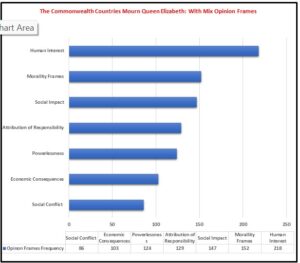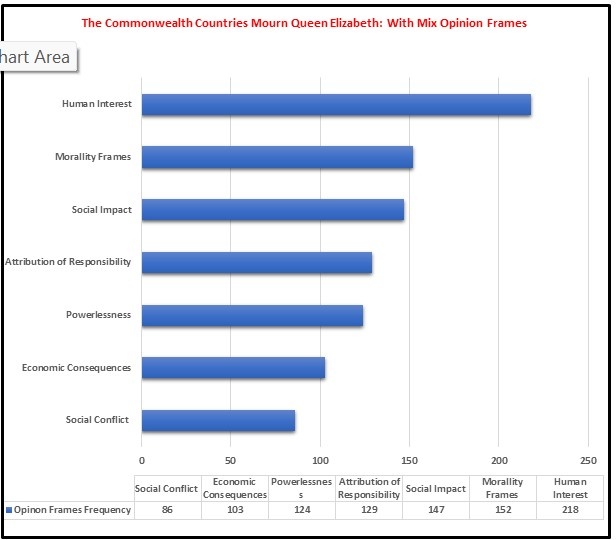…Commonwealth countries’ ePaper media framing of the British monarchy
God bless the Queen, and may her departed soul rest in the Lord’s everlasting peace. The 96-years-cannons and the bell sounds were heard, and the whole wide world responded Amen and Amen in so many languages that could only be described as global voices in a rainbow of languages. This is how families of the world bade farewell to the world’s granny, mother, wife and sister respectfully, known as Her Majesty Queen Elizabeth II (Elizabeth Alexandra Mary) who in reigned the United Kingdom of Great Britain, Northern Ireland and the realms of the Commonwealth from 1952 to 2022. As The Queen, she headed the fifty-five nations that to a large extent evolved out of the former territories of the British Empire, forming the association – The Commonwealth – which was established by the 1949 London Declaration. The Commonwealth continue to share close diplomatic relations with Britain through Her Majesty Queen Elizabeth II; hence, the loss and grief of The Queen was a loss for The Commonwealth nations.
The background
In spite of the global solemnity toward The Queen’s demise, other shades of voices within the Commonwealth chose to attach sentiments of critique and indifference toward the monarchy as an institution. It must, however, be established that Her Majesty the Queen’s personality is different from the British Monarchy. The monarchy is a royal institution. Respectfully and in dignity, as human and cultural courtesy demands from society, the eternal passing of a person – either a royal or non-royal – demands solemn reverence. Notwithstanding, opinions expressed through the media across The Commonwealth nations depicted frames of grief, indifference and critique in news opinion headlines such as: “How will King Charles III respond to reparation demands”? –The Jamaica Observer 20/09/22 12:02am. Further, indifferent sentiment media frame was expressed by the Jamaica Observer ePaper under the news headline: “The Queen is dead, time to cut ties” – 20/9/22/ 12:00 am. Also, according to Klandine Thomas, in reference to the Independent – a British newspaper, in its recent publication, cited Jah Mickey Bowe, vice-chair of the House of Rastafari in The Bahamas as saying, “Within the Bahamas, those leading the charge to openly mourn The Queen are migrants from Britain, politicians and older citizens raised under British rule, with the younger generations being largely indifferent“. The indifferent sentiments as observed by the British newspaper within the Bahamas is also expressed in Nigeria under the news headline – “King Charles III and the imperatives of reparation” – The Guardian, 19/9/22/ 4:10am. Similarly, in Zambia, an indifferent news frame toward the Queen’s demise was depicted under the news opinion headline frame “Queen Elizabeth II will be laid to rest, but not so the past”- Lusaka Times 15/9/2022. Ugandan media also projected the Queen in an indifferent media headline frame of “Queen Elizabeth is dead, good riddance” – The Monitor 19/9/2022. Again, the media voice of indifferent frame was echoed in Canada by the Toronto Star newspaper – “Farewell to the Queen” -The Star 19/9/2022. Besides the media frames, an academia with roots in The Commonwealth at Carnegie Mellon University also expressed an indifferent frame as reported by the New York Post “Jeff Bezos slams professor for wishing Queen Elizabeth an ‘excruciating’ death”- New York Post 8/9/2022 2:14pm.
It is against these strands of indifferent mourning narratives as expressed through the media that this study on news framing analysis evolved. The objective is to ascertain how The Commonwealth countries’ opinions through the media framed the British Monarchy during the time of mourning and grief from the 8th of September to the 19th of September, 2022.
Media and news narrative framing typology
From the social functionality and news narrative selections perspective, the media is a provider of information, knowledge and entertainment in the society. These social functions of the media are meant to steer society toward social unity and for human development. The media performs these social functions through the processes of selection by giving certain aspect of the news either less or more prominence in order to set a particular political, social or economic agenda. Besides setting news agenda through what issues and topics the public should think about, the media also provide certain schemata to influence how the public processes news topics cognitively. The devices such as words, symbols, tones, colour, quotes, references, and overall content are used in framing a news topic in order to achieve a needed cognitive impact otherwise known as news framing processes.
Deductively, media framing narrative is a cognitive process embedded in moral evaluations, casual reasoning, human principles and social recommendations for actions toward a problem or a cause. With these understanding of media framing, this study developed the following seven (7) news framing typologies in order to measure and established frames Commonwealth countries attached to the Queen’s mourning narratives. The typology frames measured by the study are:
- Human interest or emotions frames attach to a news angle.
- Attribution of responsibility frame of projecting an issue or event in a way of attributing responsibility to an actor for causing distress to a group of individuals.
- Powerlessness frames presenting news from an angle of dominant power over weaker groups within society.
- Economic angle news frame, described as prescribing a news narrative in the context of economic values of profit and loss.
- Human moral values frame is an aspect of the news that seeks to interrogate moral values and appeal to moral conscience.
- Conflict frames is also about presenting news from a perspective of an ongoing socio-political contest of winners and losers.
- The human impact frame refers to a news angle that invoke the impact of an issue, event, or policy impact on individuals or group of people in a society.
Public opinion framing
The media selected for this study were top ten (10) online news, otherwise referred by this study as ePaper Media from The Commonwealth countries excluding United Kingdom (since it is the host actor of the enquiry) yielding fifty-five (55) countries. Period of the analysis was from the 19th to 20th September, 2022 which was intended to cover the day of Queen’s burial and a day after the burial. Purposeful sampling was used in the selection of one (1) medium from the top ten media list of each Commonwealth country. The study units for the study were opinion, editorials and commentaries depending on how a medium described her opinion page. News was excluded from the study units. Methodology used for the analysis was qualitative content research analysis which allowed for data coding and categorisation, comparative, elaborations, simplification and integration. This further established a total of 698 opinion statements units (total sentences from the 18 news opinions in 18 media).
The seven (7) framing typology were operationalised as follows:
- Human interest frames – Human interest content touching on the human interest aspect of the funeral.
- Morality frames – Story angles invoking inhuman, immoral, or moral uprightness experiences within the Commonwealth countries in the past.
- Social impact frames – Opinion angles referring to the impact of colonialism, slave trade, imperialism and the monarchy on Commonwealth countries.
- Attribution responsibility frames – Opinions and expressions calling on the monarchy to take responsibility for its past policy initiatives in the Commonwealth.
- Powerless frames – Refers to past power relations and power dominations over the Commonwealth.
- Economic consequences frames – Expressions toward the monarch’s past imbalance economic and trade policies within the Commonwealth.
- Social conflict frames – are expressions or agitations calling for equality and reparations toward the Commonwealth countries.
Multiple data coding was allowed with inter-coder reliability established. A total media of 18, representing 18 countries out of the 55 Commonwealth countries, were captured during the study period: [ Jamaica-Jamaica Observer, Fiji– Fiji Times, New Zealand – News Room, Sri Lanka -Daily News, Ghana – News Ghana, Nigeria – The Guardian, Kenya – The Star, Rwanda – New Times, Uganda – The Monitor, Trinidad and Tobago -The Trinidad Express, South Africa – Mail & Guardian, Malta – Malta Today, India – The Hindu Times, Canada – The Toronto Star, Bangladesh – The Daily Star, Barbados – Barbados Today, Bahamas – The Tribune, and Cyprus – Cyprus Mail ] It was analysed with the results as presented in the following chart headed as:
–The Commonwealth countries mourn Queen Elizabeth: With mix opinion frames.

Analysis and results
From the chart, Queen Elizabeth II was mourned across Commonwealth countries with mix opinions or feelings: 23 percent of the mourning frame was on human interest aspect of the grief, 13 percent touched on the powerlessness of the Commonwealth countries’ relations with the monarchy. 13 percent of the opinions relating to the monarchy called on the British monarchy to accept her responsibilities of the past and promote reparation initiatives, 16 percent of voices refer to human moral values, 15 percent projected the impact of the monarchy’s legacy on the Commonwealth societies, 9 percent on the voices for equity in the relations between the monarchy and the Commonwealth, and 11 percent of opinions also touched on trade and economic imbalances that existed between the monarchy and the Commonwealth countries in the past.
In summary, in mourning Queen Elizabeth II, media opinion articles in 18 Commonwealth countries laced their grief with over 79 percent opinion frames in the contexts of the monarchy’s colonial, imperial, slave trade relations, reparations atonement and agitations. To an extent, this study would throw light on the sentiments lingering in the minds of public opinions within the Commonwealth countries, and subsequently assist in international relations strategy, management and engagement for global harmony. This study, is limited to only two days, further inquiry could extend the study period, the number of media, and consider other media platforms. Also, future study could expand the typologies to cover perhaps historical antecedents in news stories.
In spite of the mixed opinions, the funeral service was brought to an end. Her Majesty the Queen’s casket was lowered gently with love for a world’s granny, mother, sister, wife into the solemn space of the royal vault, and in silence, the Queen’s piper ended it peacefully in a holy lament called ‘Sleep, Dearie, Sleep’.
Messan is a strategic corporate communication consultant and a university lecturer.
From: The Meadows, Castle Rock: Colorado
Email: [email protected]










